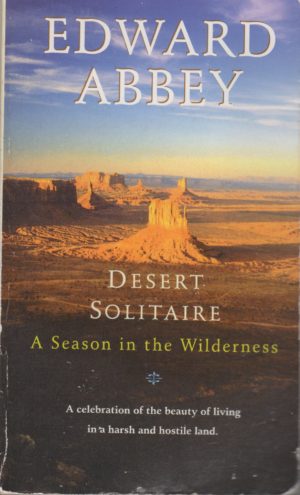
Desert Solitaire: A Season in the Wilderness by Edward Abbey (1971. Ballantine. ISBN 345326492)
It was fortuitous that my friend Dave was reading this book when we were together on vacation. That’s true in two ways. First, I was about halfway through All the Wild that Remains, a profile and comparison of the wilderness ethics and lives of Edward Abbey and Wallace Stegner when Rene’ and I met up with Dave, his wife Lail, and some other friends in Scottsdale about a month ago. Secondly, because we were staying near Phoenix, a city that demonstrates issues raised by Abbey and Stegner in many of their writings (including the most obvious-that deserts and much of the arid West are not places to build cities because there is little water), the fact I was reading David Gessner’s new book about two icons of Western literature and my pal was reading Abbey’s classic memoir of a summer spent at Arches National Monument as a ranger was, well, just plain spooky. So it was only natural that, when I finished All the Wild that Remains, and Dave finished Desert Solitaire, we exchanged books and kept right on reading. Here’s my take on Abbey, having known about him, read about him, but having never read him until now.
We eat lunch, Ralph and I, and lie for another hour or two in the willow glade until the bright inferno in the sky has edged far enough westward to let the cliffs shade part of the river. Then we launch off, in the middle of the afternoon, and paddle across the current to the shady side, abandoning ourselves once more to the noiseless effortless powerful slide of the Colorado through its burnishes chute of stone.
This passage, though not written about Abbey’s time spent at Arches but about an earlier trip through Glen Canyon to float an untamed and undammed section of the Colorado that Major Powell explored a century earlier, is typical of the magnificent prose Abbey is able to summon. Of course, given the author’s reputation as a monkey wrenching environmental saboteur, not every page is filled with literary greatness. At times, in an effort to promote his beliefs, including the major theme of his summer in Arches; that the federal government should stop paving gravel entrance roads to make trips by citidiots to our national treasures (National Monuments, Parks, Forests, and Wilderness Areas) easier and simply leave wilderness to be wilderness, Abbey comes off as preachy, condescending, and mean spirited. Ah, but that is but one aspect of what Abbey has to offer. The other more subtle, more Stegner-like side of the man is epitomized by countless passages and scenes like the one excerpted above: great writing that pulls you into a fascinating world where rain is occasional, brutal, but life sustaining, and where only the well-prepared human visitor should enter. There is much to admire in the man’s curmudgeonly discourse about modern America. There is much truth in his observations about the government being willing to alter nature and geography, such as creating Lake Powell behind the Glen Canyon Dam, despite the folly of such artifice. How much water is lost from that impoundment due to evaporation? How many tons of silt and mud and decay pile up behind the concrete restriction of the river, ultimately causing the lake to become cloudy, warm, and foul? How much of the vital sense of place, the taming of the wild for the gains of a few million fools who wish to play golf or water ski or water grass lawns in the desert is lost when a river like the Colorado, the major source of water for a huge watershed, is captured and tamed? Abbey may be cranky, ornery, and foul-mouthed in his occasional rants against “The Man”. But his manner of addressing the implausibility of Phoenix and Las Vegas and Denver is no less credible or valuable than Stegner’s more professorial approach. Indeed, in some ways, Abbey’s unhinged discourse may be exactly the medicine we need today. In the present age, an age Abbey would likely rail even more profusely against, America finds itself confronted by federal leadership hell bent on “opening up the West” (allowing unrestricted mining, logging, grazing, drilling and other commercial uses of nationally-held lands) and decommissioning sacred, rare places like Arches National Monument; a sanctuary of desert originality holding on for dear life against the uninformed, narcissistic stroke of the presidential pen.
An astounding, if slightly disorganized (Abbey tends to meander from the story of his summer at Arches to other tales, though all have merit and should be read), call to arms. You don’t have to agree with every premise advanced by this self-styled apostle of wilderness but you do have to accept that much of what he said nearly fifty years ago has, and is, coming true.
Excellent.
4 and 1/2 stars out of 5.
Peace.
Mark


